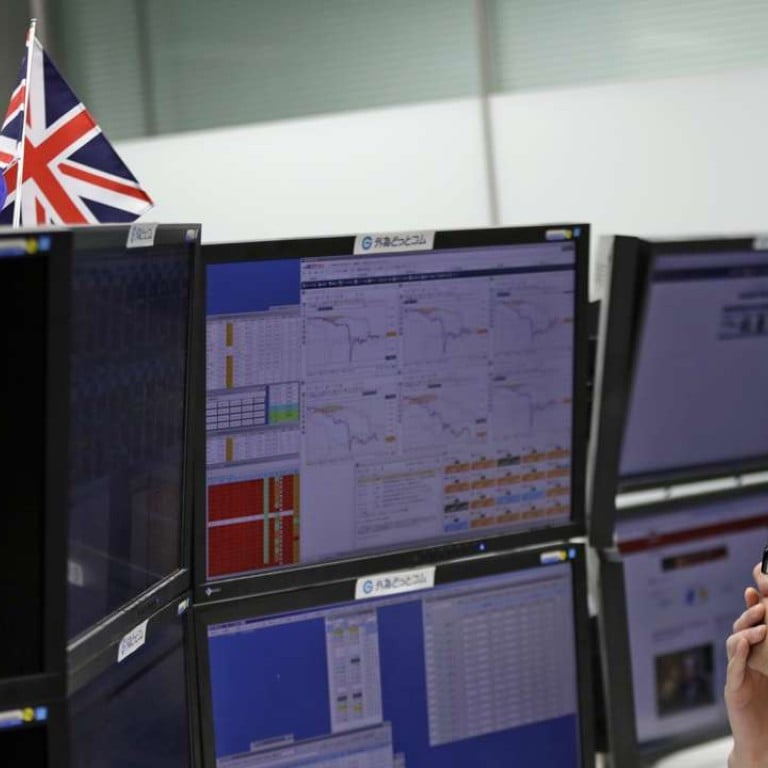
Referendum result thumps UK-linked stocks, as pound crashes to 31-year low
HSBC, Standard Chartered, Cheung Kong Infrastructure Holdings hit hard, before Hang Seng eventually closes 2.92 per cent down after roller-coaster day
British related stocks, including HSBC and Standard Chartered Bank, were hit hard on Friday in Hong Kong trading.
With the pound diving to a 31-year low after the British voted to leave the European Union, analysts now think the global financial fallout could last for sometime, with Hong Kong feeling the effects too.
The Hang Seng index dropped almost 1,000 points intraday, before eventually closing down just over 600 points, or 2.92 per cent. Japan stocks lost 8 per cent.
In early European trading, the FTSE-100 fell 4.4 per cent, while Paris’ CAC dropped 7 per cent.
HSBC shares ended down 6.59 per cent at HK$47.75, while Standard Chartered lost 9.48 per cent to close at HK$57.75. Both banks have their headquarters in the United Kingdom.
Shares in three companies in Li Ka-shing’s stable, CK Hutchinson Holdings, Cheung Kong Infrastructure Holdings and Power Assets Holdings, were also hurt, falling 5.07 per cent, 5.48 per cent and 4.76 per cent respectively.
Hong Kong-listed Power Assets generates 48 per cent of its revenue from Britain, while Cheung Kong Infrastructure earns 28 per cent of its income from the country, according to a report by Nomura.
Commenting on the referendum result, HSBC chairman Douglas Flint said: “As one of the largest, most stable, liquid and prudent financial institutions in the world, HSBC is well placed to support our customers and the markets as they deal with the challenges that will arise.”
A spokesperson for Standard Chartered in Hong Kong insisted the vote “has no immediate direct impact” on the bank.
“If there is market volatility, our liquidity and capital position is such that we will be able to continue to support clients as at present.”
Louis Wong, a director at Phillip Securities said the vote to leave will “deal a blow to the British economy and be felt on the balance sheets of British banks and those companies with exposure to the UK”.

Just hours earlier the beleaguered currency had hit its yearly high of US$1.5018, before vote counting had begun.
Morgan Stanley now believes the pound will drop another 5 per cent.
A weaker sterling is likely to hurt Hong Kong investors who have bought property in Britain, said experts, but winners are likely to be parents who have send their children to study in Britain, who will need less Hong Kong dollars to pay their tuition fees in pounds.
The foreign exchange store at Mirador Mansion in Tsim Sha Tsui said it had seen a steady stream of people buying pounds, after news of the vote hit the streets.
Unison Foreign Exchange told the Post they have run out of sterling by midday as customers queued to buy the currency.
An unnamed dealer with Shere Punjab Exchange said it had around 20 more sterling buyers than normal.
He described his best rate as “very, very low”, adding it would “definitely continue to drop following Prime Minister David Cameron’s resignation”.
The pound to the Hong Kong dollar had dropped to a 30-year low of HK$10.24 by noon.
It also dragged the Chinese yuan to a five-year low, with onshore yuan down 0.61 per cent to 6.6121 yuan per US dollar. The Japanese yen became a safe haven and rose to a two and half year high against the greenback.
Brett McGonegal, chairman and chief executive of Capital Link International, said: “Brexit is certainly bad in the short term for equities.
“The pound will continue to trade lower after the hedges get squared at these levels. The euro will weaken while the pound and the US dollar will firm up and rise, hurting emerging markets.”
John Mullally, director of financial services at Robert Walters Hong Kong, said there may be more redundancies in the financial sectors as a result of the Brexit vote.




